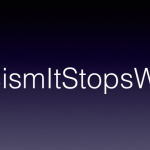On the nose: perfumer sparks racism furore

Last month, I discussed a problem of foreignness emerging from France. This month, coincidentally, I again turn to a controversy from France that has gripped the world’s attention—one that reveals how language can create and perpetuate notions of Otherness and foreignness.
Jean-Paul Guerlain, who once worked for the famous high-end cosmetics line that shares his last name as its name, has fallen under the media spotlight for racist remarks he recently made in an interview on French television. Out of decency, I will not reproduce his remarks on this blog, but major news media sources across the world such as The Guardian are reporting them.
There is no question that Guerlain’s words are shockingly racist and deserve unequivocal condemnation. Guerlain himself has apologized for his remarks, stating, “My words do not reflect in any way my profound thoughts but are due to an inopportune misspeaking which I vividly regret.”
Unfortunately, this incident seems to be just another iteration of an ever-recurring worldwide problem of the public use of racial epithets. The U.S. media readership in particular has perhaps by now become accustomed to prominent figures who violate media standards—as well as standards of decency—in their choice of words.
The media has stringent guidelines on what can and cannot be said on TV, and these rules are important. Pejorative language in and of itself creates a climate of rancor and hate, and its prohibition in formal settings is essential. What we say in private settings must fall on the discretion of individuals, who are entitled to free speech. Yet what we say privately shapes our reality, reality for our family members, and how we think and feel about those around us. Guerlain himself is an autonomous individual with control over his speech and actions, but he is also a product of his environment and upbringing; condemning his words is not just a criticism of his speech, but also a denunciation in general of the reaffirmation and reinforcement of a national past that included slavery practiced along racial lines.
But simply condemning racist epithets is hardly an adequate solution. The problem is not just a poor choice of words. It is much more fundamental.
Although Guerlain maintains that his remarks are not representative of his “profound thoughts,” the continuing existence of racial epithets in our social lexicon suggests that society has yet to expunge racist thought from its shared psychology. That is, publicly we have an intellectual appreciation of the “wrongness” of using pejorative language, but this has not transformed into a genuine belief that always informs our behavior.
When we refrain from using racist pejoratives not out of fear of consequences, but because we could never imagine doing so, racism will be a thing of the past.
Racial epithets, then, represent a type of psychological Otherization that unfortunately still runs deep in our society. The language we still use in society, including Guerlain’s recent remarks, demonstrate that racial lines persist as a boundary between “self” and “foreign.” We cannot fix this simply by banning words and condemning people when they use those words. Rather, what we need is a transformation into a society in which we no longer see race—that is, a society in which no race is “foreign.”







